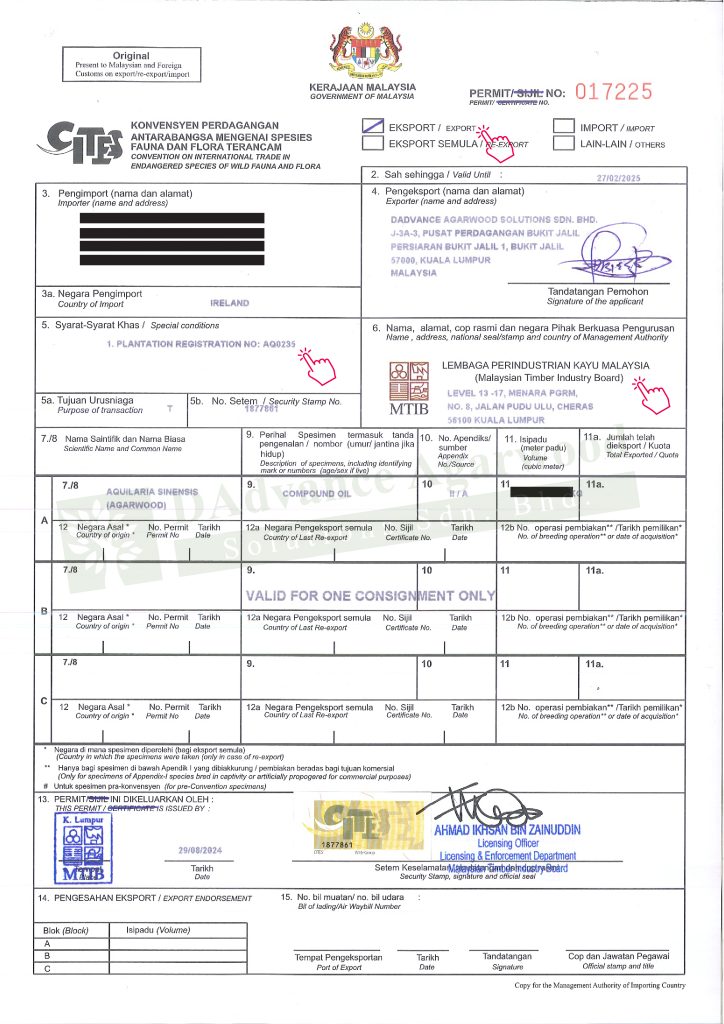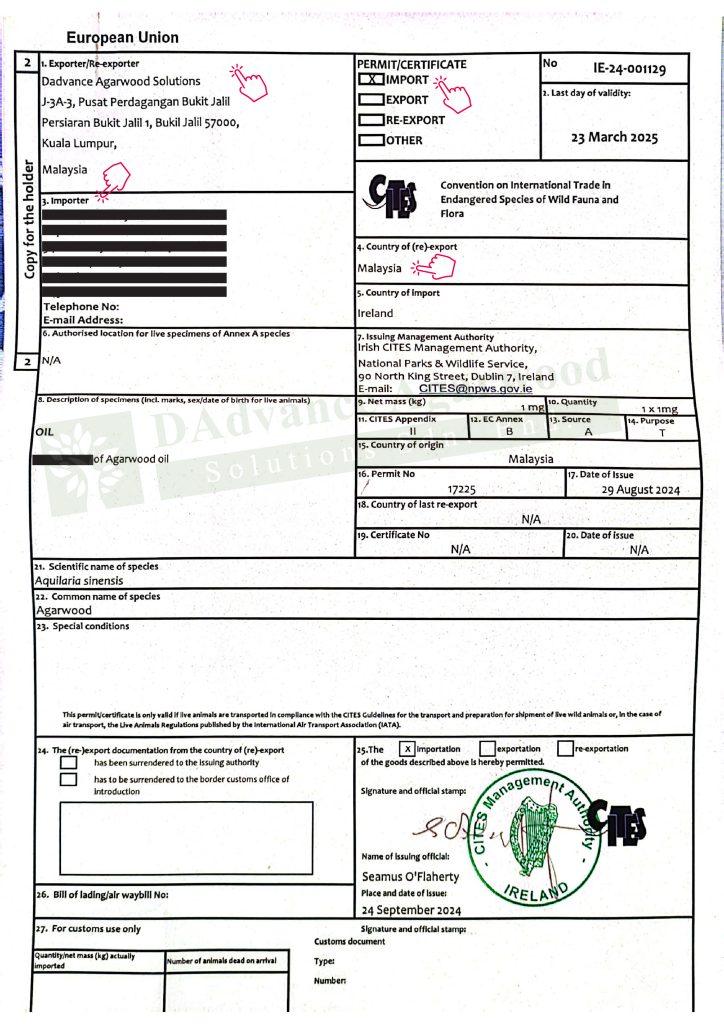If you’re involved in the agarwood business, understanding the significance of CITES regulations is not just important—it’s essential. Whether you’re a seasoned agarwood exporter or just entering the market, the rules set by CITES (Convention on International Trade in Endangered Species) shape how you navigate international trade and ensure your business remains compliant and sustainable.
Agarwood, known for its unique fragrance and highly valuable resin, is in high demand globally, especially in markets such as perfumes and traditional medicine. However, over-harvesting has put this precious resource at risk, which is where CITES steps in. By controlling the international trade of agarwood, CITES ensures that agarwood species are protected, illegal trade is minimized, and businesses like yours can operate ethically and sustainably.
CITES is an international agreement designed to regulate the trade of endangered species, and when it comes to agarwood, it plays a crucial role. Agarwood is listed under CITES Appendix II, which means that while it’s not considered endangered yet, its trade must be regulated to prevent over-exploitation.
So why should this matter to you as an exporter? Without the right permits, shipping agarwood internationally could land you in hot water—confiscation of goods, heavy fines, or even legal action. But by staying compliant with CITES regulations, you not only ensure smooth business operations but also contribute to global sustainability efforts.

sample of CITES export permit
The Fatal Consequences of Exporting Agarwood Without a Valid CITES Application
Attempting to export or import agarwood without a valid CITES permit is not just a regulatory misstep—it can have severe legal and financial consequences. The penalties for non-compliance with CITES can include hefty fines, imprisonment, and permanent damage to your company’s reputation. Authorities have become increasingly vigilant, and they actively monitor shipments of agarwood to ensure compliance with international law.
In addition, issuing fake CITES permits or falsifying documents is considered a serious offense, leading to criminal charges and potential bans from engaging in future international trade. Businesses that attempt to cut corners by using fraudulent documents often face prosecution, significant financial loss, and a complete halt to their operations.
The risks associated with bypassing proper CITES regulations far outweigh any short-term gains. It’s critical for businesses to follow the legal processes, ensuring all CITES applications are valid, up-to-date, and properly managed.
The CITES Certification and Permit Process for Agarwood Exporters
Getting the right permits is the cornerstone of legal agarwood exportation. But how does the CITES permit process work, and what should you expect?
First, you’ll need to apply for a CITES export certification through your country’s regulatory authority and followed up by CITES importation permit. This step involves providing detailed information about the source of your agarwood, including how it was harvested and proof that it complies with all CITES guidelines. Once your application is approved, a CITES permit will be issued, which must accompany your agarwood shipments.
This process can seem complex, especially for new exporters, but it’s absolutely necessary. Having your CITES approval for agarwood guarantees that your products are legal and traceable, giving your business credibility and ensuring smooth international trade.
Challenges Faced by Agarwood Exporters Under CITES
Like most regulations, complying with CITES comes with its own set of challenges. For many agarwood exporters, the CITES certification process can be time-consuming and sometimes costly. There are delays in obtaining permits, paperwork that needs to be carefully managed, and country-specific regulations that can complicate things further.
Another challenge is the fluctuating nature of CITES quotas, which can impact how much agarwood you’re allowed to export in a given period. Additionally, different countries have their own sets of regulations on how agarwood is sourced and traded, making it essential to stay up-to-date with international laws.
However, while these challenges exist, they are far outweighed by the benefits of CITES compliance. Navigating this process ensures that your business can continue to operate legally and ethically, paving the way for long-term success.

Sample of CITES IMPORT Permit from the importer.
How CITES Helps Combat Illegal Agarwood Trade
One of the primary goals of CITES is to combat illegal agarwood trade, which has long been a problem in the industry. Illegal harvesting and unregulated trade pose serious threats to agarwood species, leading to environmental degradation and reducing available supplies for legitimate businesses.
By enforcing strict regulations on how agarwood is sourced and exported, CITES helps ensure that the trade remains ethical. For your business, this means that adhering to CITES regulations not only helps preserve agarwood for future generations but also builds trust with consumers and international partners.
Sustainability is becoming a major focus across global markets. As an agarwood exporter, staying compliant with CITES guidelines positions your business as one that operates responsibly, earning you credibility and distinguishing your products in an increasingly competitive marketplace.
Ensuring a Sustainable Future for Agarwood Through CITES Compliance
In the ever-growing agarwood market, adhering to CITES regulations isn’t just about ticking legal boxes—it’s about ensuring the sustainability of your business and the environment. By securing the right permits and following CITES certification processes, you safeguard your operations from legal trouble, contribute to ethical trade, and help protect the future of agarwood as a valuable resource.
But remember, trying to bypass the system by exporting without a valid permit or issuing fake CITES documentation can result in serious legal consequences, including the loss of your business. Ensuring your compliance with CITES not only protects your business but contributes to the broader effort of preserving the environment and maintaining a sustainable future for agarwood.
As consumers and governments alike continue to emphasize the importance of ethical and sustainable practices, staying ahead of CITES requirements will ensure your business thrives in the long run. Whether you’re a small-scale exporter or a large commercial entity, CITES compliance is the key to successful international trade and a sustainable future for the agarwood industry.



